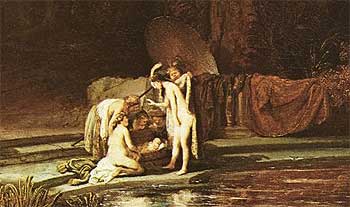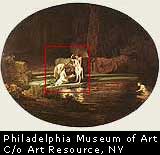
The Barren Princess
Moses was born during a reign of terror. Pharaoh decreed that every male Hebrew baby must be cast into the Nile. Moses was hidden for three months in his mother's home. When she could no longer conceal the child, she prepared an ark for him and set it afloat upon the Nile. Through a remarkable twist of fate, Pharaoh's own daughter found the ark and was drawn to the child, whom she adopted and raised in her father's palace.
In this masterful example of biblical narrative, the story moves subtly from the fortuitous to the providential. The text does not supply any apparent explanation as to why Pharaoh's daughter would leave the opulence of the royal palace and go down to bathe in the Nile. Nor is there any explanation as to what might have possessed her to rescue the child and raise him as her own. The commentators rush in to fill in the blanks.
Philo of Alexandria offers background information, which helps the reader understand the story in context:
The king of the country had but one cherished daughter, who we are told, had been married for a considerable time but had never conceived a child, though she naturally desired one, particularly of the male sex, to succeed to the magnificent inheritance of her father's kingdom, which threatened to go to strangers if his daughter gave him no grandson. Depressed and loud in lamentation she always was, but on this particular day she broke down under the weight of cares; and, though her custom was to remain at home and never even cross the threshold, she set off with her maids to the river, where the child was exposed. (De Vita Moses I, 13-15)
By describing Pharaoh's daughter as barren and forlorn, Philo has explained both why she left the palace, going down to the Nile in a state of utter despair, and how she allowed herself to daringly adopt and raise a Hebrew child.
The Supernatural >>